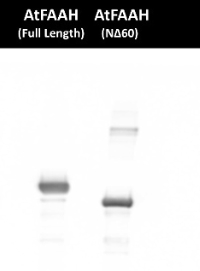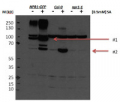1

Anti-FAAH | Fatty acid amide hydrolase
AS16 3972 | Clonality: Polyclonal | Host: Rabbit | Reactivity: Arabidopsis thaliana
- Data sheet
- Product Info
-
Immunogen: KLH-conjugated synthetic peptide derived from Arabidopsis thaliana FAAH protein sequence UniProt: Q7XJJ7, TAIR: At5g64440
Host: Rabbit Clonality: Polyclonal Purity: Serum Format: Lyophilized Quantity: 50 µg Reconstitution: for reconstitution add 50µl, of sterile water Storage: Store lyophilized/reconstituted at -20°C; once reconstituted make aliquots to avoid repeated freeze-thaw cycles. Please remember to spin the tubes briefly prior to opening them to avoid any losses that might occur from material adhering to the cap or sides of the tube. Tested applications: Western blot (WB) Recommended dilution: 1 : 1000 (WB)
Expected | apparent MW: 65.8 kDa - Reactivity
-
Confirmed reactivity: Arabidopsis thaliana
Predicted reactivity: Acorus calamus, Actinidia chinensis var. chinensis, Aquilegia coerulea, Chimonanthus praecox, Chloranthus japonicus, Cucumis melo, Dioscorea oppositifolia, Eucalyptus grandis, Fragaria vesca, Glycine soja, Gossypium raimondii, Houttuynia cordata, Magnolia denudata, Manihot esculenta, Morus notabilis, Nelumbo nucifera, Panicum miliaceum, Phaseolus vulgaris, Phoenix dactylifera, Platanus acerifolia, Populus trichocarpa, Ricinus communis, Sarcandra glabra, Setaria italica, Sorghum bicolor ,Theobroma cacao, Trachycarpus fortunei, Zea mays, Zostera marina, Vigna radiata, Vitis vinifera, Yucca filamentosa
Species of your interest not listed? Contact usNot reactive in: No confirmed exceptions from predicted reactivity are currently known - Application Examples
-
Application example
Recombinant AtFAAH was expressed in E.coli TOP10 cells from the pTrcHis2 plasmid. The recombinant His-tagged protein was purified from the cell lysate using metal-affinity chromatography (Ni-NTA Agarose beads), followed by size-exclusion FPLC. 1 µg of the purified AtFAAH in BTP buffer (50 mM Bis-Tris propane, pH 9.0, 100 mM NaCl, 0.03 % w/v DDM) was denatured by boiling in 2X SDS loading buffer with DTT at 95°C for 5 min; separated on SDS-PAGE (Bolt 4-12% Bis-Tris plus gels; Invitrogen); and blotted to PVDF membrane for 30 minutes using semi-dry transfer (Bio-RAD System). Blot was blocked with 5% milk ON/RT with agitation. Blot was incubated in the primary antibody at a dilution of 1: 1000 for 1h/RT with agitation in TBS-T. The antibody solution was decanted and the blot was rinsed 3 times (5 min each) in TBS-T at RT with agitation. Blot was incubated in Agrisera matching secondary antibody (Goat anti-Rabbit IgG, HRP conjugated) diluted to 1:10,000 for 1h/RT with agitation in TBS-T. The blot was washed as above and developed for 5 min with Clarity Western ECL Substrate (Bio-RAD). Exposure time was 5 seconds. N.B. * The full-length AtFAAH, the truncated AtFAAH (NΔ60), and the rat FAAH (negative control) recombinant proteins were all expressed and purified using the same protocol. Also, 1 µg of each purified protein was used for the Western blot experiment. * The primary antibody solution: 20 µL anti-AtFAAH antibody + 2 mL of the blocking buffer + 18 mL TBS-T). * The secondary antibody solution: 2 µL secondary antibody + 2 mL of the blocking buffer + 18 mL TBS-T).
Courtesy of Dr Mina Aziz, Department of Biological Sciences, University of North Texas, USA - Background
-
Background: FAAH (Fatty acid amide hydrolase) is an enzyme, which degrades bioactive fatty acid amides to their corresponding acids, thereby serving to terminate the signaling functions of these molecules. Converts N-actylethanolamine (NAE) to ethanolamine. Might be involved in abscisic acid signaling and plant defense.
- Protocols
-
Agrisera Western Blot protocol and video tutorials
Protocols to work with plant and algal protein extracts
Agrisera Educational Posters Collection
- Reviews:
-
This product doesn't have any reviews.



